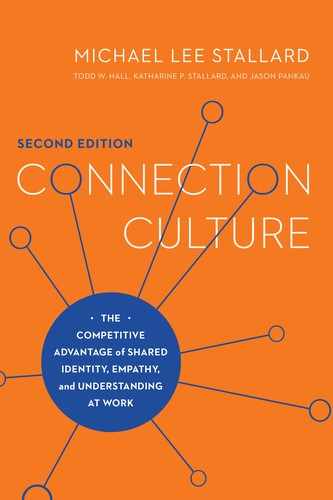Foreword
Connection Culture presents a new way of thinking about leadership, employee engagement, and organizational health. It shares the stories of many different organizations that found tremendous success by nurturing connections—from Costco to the U.S. Navy to the Duke University men’s basketball team. Combining an array of data and research findings as well as examples from real-life experiences, Michael Lee Stallard makes the compelling case that a culture of connection provides a clear competitive advantage for organizations and individuals. Connection Culture provides powerful tools for enriching and transforming organizations.
Texas Christian University (TCU) is proud to be one of the organizations profiled in Connection Culture. At TCU, our goal is to produce graduates who can deal with change, motivate others, and think and act responsibly in a global community. These are the qualities most needed for leadership and thriving in the future.
And we want to do more.
Some years ago, I was intrigued to learn that Stallard, the father of two of our students, was an expert on leadership and organizational culture. What he wrote on connection culture resonated with me. During my career in higher education, I’ve seen students thrive when supportive relationships make them feel connected, and I’ve seen how they struggle when they feel lonely. I was pleased to see how TCU’s culture resonated with Stallard’s connection culture theory—the university’s culture is rooted in a long history of valuing service to others and inclusiveness, both of which increase connection.
TCU’s connection culture has always been led by the people who become part of the TCU community. This focus on personal connectivity is modeled at all levels of faculty, staff, and student leadership—on campus and around the globe.
In an effort to strengthen our culture of connection even further, TCU has partnered with Stallard to create the TCU Center for Connection Culture. It begins at home as we equip our faculty, staff, and students with the skills to be more intentional about connection. We are committed to embracing connection programs and activities for our entire university as well as for community participants. We desire to be a beacon of connection and a model for other institutions that strive for community, inclusion, and ethical leadership.
While reading Connection Culture, I was reminded of Moore’s Law, which states that the processing power of computers will double every two years. I find this to be an apt metaphor for the rapidly evolving environment—one for which we must prepare our TCU graduates. This book provides positive ways of thinking and acting that can help them—and us all—navigate the future.
Our World Has Changed and Our Perspectives Have Broadened
Even now, as I write this update to the foreword for the second edition, a worldwide pandemic is unfurling and information on COVID-19 is spreading as quickly as the virus itself. We are in the midst of enacting sweeping measures: distance learning, working remotely, and the cancellation of gatherings that make being a Horned Frog so meaningful.
This historic season has tested not only life here at Texas Christian University, but life as we know it everywhere. The global COVID-19 pandemic suddenly challenged the way we live and learn, radically altering the way we relate to one another.
Or did it?
When our beautiful campus resembled a ghost town, the tulips kept right on blooming, and the sharing of ideas and resources flourished right along with them. I watched with gratitude as a new normal unfolded for a spirited Horned Frog family that can never truly be separated, even when apart.
What we are experiencing right now makes the elements of this book even more relevant. Because TCU has long fostered a sense of community, our emotional connection is strong and we were able to build upon those relationships for the betterment of our students.
Our rallying cry is #TCUTogether, a campaign launched to share the many stories of Frogs Helping Frogs. Almost immediately, student affairs began hosting virtual events to bring students closer together and combat feelings of isolation. I launched a video series direct to students and receive (and respond to) hundreds of emails per week. I can’t count the number of live online events, Zoom calls, and touchpoints TCU has created to grow our connection and support our community, even in this time of social distance.
These unprecedented times have taught us all that although we are apart, a Horned Frog will never be alone.
Victor J. Boschini Jr.
Chancellor, Texas Christian University
April 2020
